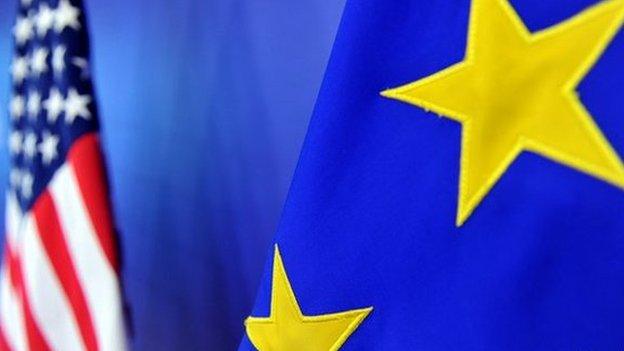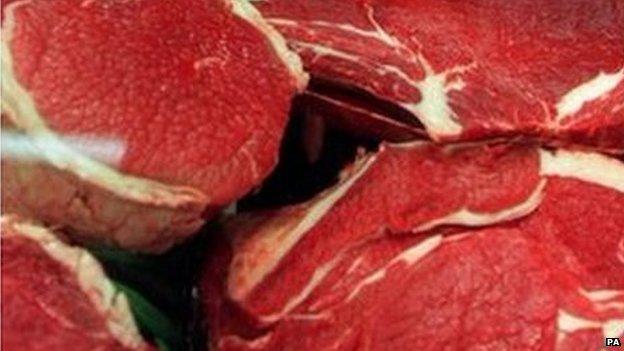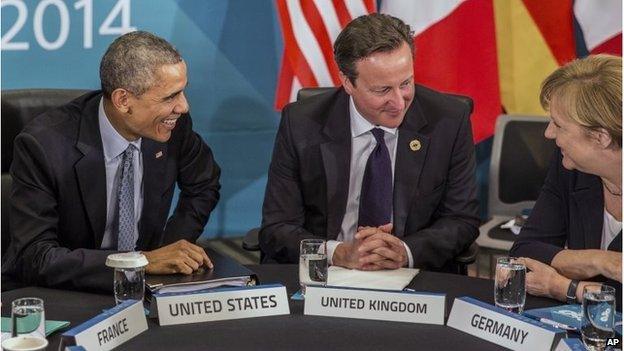Tipping point for TTIP?
- Published

The idea that Americans know how to run Britain's health service more efficiently seems laughable. The US health system is in the global super-league for inefficiency.
But that threat is for real, if you listen to critics of trade talks between the US and the European Union.
TTIP, or the TransAtlantic Trade and Investment Partnership talks, kicked off 18 months ago. Predictably, it's heavy going, as this is complex stuff.
It's going to get heavier still, as politics is getting in the way. A European anti-TTIP movement has been gathering steam. And then there's gridlock in Washington, of which more later.
For all the high-level negotiations, this comes close to home. It has to get through the US Congress and ratified by all 28 European national parliaments.
That doesn't include Holyrood, though MSPs are inquiring into the implications for Scotland.
In late November, they heard from critics, including trade unionists and an environment campaigner. This week, it was from those who stand to gain, including textiles, whisky and life science exporters. So I've been trying to find out what the fuss is about.
Slippers
Here's the case for. In theory, trade works for everyone. If everyone plays to their strengths, they're all winners.
So on that basis, a think tank study from the Centre for Economic Policy Research - quoted by the European Commission and UK Government - suggests £100bn benefits to the EU, £80bn to the US and £85bn to the rest of the world, where they gain from being in the supply chains to these two giant economies.
Those numbers are hotly disputed. And that's partly because EU-US trade is already well developed. The average tariff, paid by either side, is below 4%, so the benefits of removing them may be overstated.
That varies a lot. On Scotch whisky, it's zero. On knitwear sweaters, it's 16%. On slippers - yes, slippers, as the American footwear industry is a formidable lobbying force - the tariff is 26%.
In the case of industries where the tariff is paid, that raises quite a lot. Of $3.5bn paid in tariffs for importing EU goods into the US, German cars take nearly $1bn, Italian fashion and footwear takes another large slice, and then there's quite a lot for French cheese.
Goats
In the case of Scottish knitwear, the 16% appears insurmountable, according to Harry Bentop of Hawick Cashmere. He told MSPs that a senior Brooks Brothers' buyer was round his mill last week, but Scotland can't compete with other countries which already have preferential trade deals.
It would make financial sense to make most of the garment in Scotland, it's claimed, and then ship it to Mauritius for finishing, thus avoiding the tariff.

And that "Made in Scotland" premium label is coming under pressure too. US negotiators want to be sure that at least three processes have been carried out in the country claiming origin.
That makes it a problem that Scotland is no place to raise the high-altitude goats that provide us with cashmere wool.
Tennent's
In any case, tariffs are not the big issue in the TTIP trade talks. Regulations are much more significant, included in so-called non-tariff barriers.
For instance, US and EU regulators have different requirements for testing the safety of cars, drugs and soft furnishings. Going through the tests is expensive, particularly in developing new medicines.
Having 50 states to the west and 28 to the east, there are internal barriers to trade too. Glasgow-based Tennent's Lager, for instance, went into the US market recently, having been a big exporter to the States in the 19th century.
It found that US law required it to stick with the complex, state-based distribution agencies which Tennent's used back then. And any alcohol exporter into the US has to deal with complex labelling requirements.
The cost of these non-tariff barriers is typically in the 10 to 20% range, so you can see the attraction to those wishing to bring them down.
And if successful, the standards set by recognising each partner's spec and safety certification could set the standards for manufacturers from elsewhere.
Samsung in Korea, for instance, is reported to be undecided on whether to use the US or EU spec for some of its next generation electronics, and if the Atlanticists can't agree, it'll go with the Chinese one.
Beef
While there are those with export potential waiting to be unleashed, there are some who may not like the bracing onslaught of imported goods.
The MSPs weren't hearing from those at this week's European and External Relations Committee meeting. They did, however, hear from the National Farmers Union in Scotland at their previous hearing.

Scott Walker argued that the beef sector is one that is particularly concerned about the different standards used in US agriculture.
Its claimed that the use of hormone growth supplements, for instance, allows more efficient production, and thus cheaper meat.
Customers follow price, and it's claimed that the rules of any trade deal will not allow retailers to highlight the difference in production methods.
Litigation
The fear of tougher, perhaps unfair, competition is just the start of the case being made against TTIP.
The bigger issue goes beyond trade, to the possibility that American corporations will use their litigious muscle to force governments into opening up their public services.
And if they're unfairly treated, there's a provision allowing them to take legal action against a European government. Moves to change packaging and retail rules for tobacco, for instance, could be challenged by American tobacco giants.
That's what happened in Australia, where tobacco giant Philip Morris Asia used a 1993 trade agreement with Hong Kong as the basis for a legal move to force a change to packaging.
It's further claimed that American companies will push to grab a share of public services. That's a particularly emotive issue in the UK, where the NHS is claimed to be under threat.
The idea is that, with the coalition contracting out some NHS provision, Americans can use that as a lever to open up that market further, while reaching into other parts of the UK.
That was a claim we heard in the latter stages of the independence referendum campaign, with the claim that the UK Government would leave NHS Scotland open to corporate exploitation.
One legal expert told MSPs that the European Commission has no powers to intervene in member states' health service, and so couldn't include it in any trade deal.
Whether correct or not, the UK government remains under pressure from trade unions and others on both sides of the Tweed, who see TTIP as anti-democratic, against established workers' rights, and unaccountable.
Fast track
The British are the most mobilised Europeans on this. Of 150,000 responses to an EU consultation this summer, a third were from the UK.

But don't forget that there is no shortage of Americans who see many of the same threats. And of course, they're not shy about lobbying their representatives.
Republicans in Congress are reluctant to give President Obama the power to fast-track a deal, meaning that Congress would only get to choose for or against it.
Without that provision, TTIP could be wrecked by amendments written by special interests, with Democrats more hostile to free trade than their opponents.
Facing those pressures, it will require political leadership to get TTIP agreed, and then ratified by governments and parliaments. It's not clear either side of the Atlantic has the necessary leadership to see it through.